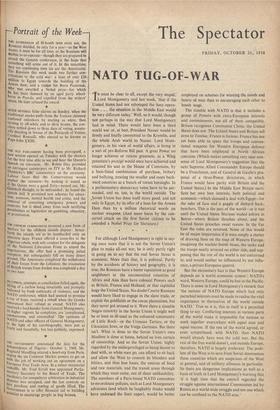NATO TUG-OF-WAR
"r must be clear to all, except the very stupid,' Lord Montgomery said last week, 'that if the United States had not sabotaged the Suez opera- tion . . the situation in the Middle East would be very different today.' Well, so it would, though not perhaps in the way that Lord Montgomery had in mind. There would have been a third world war or, at best, President Nasser would be firmly and finally committed to the Kremlin, and the whole Arab world to Nasser. Lord Mont- gomery, in his view of world affairs, is living in a sort of pre-Reform Bill past. A great Power no longer achieves or retains greatness, as a Whig potentate's protégé would once have achieved and retained his seat in the House of Commons, by a ham-fisted combination of purchase, bribery and bullying, treating the smaller and more back- ward countries as a bunch of rotten boroughs. In a parliamentary democracy votes have to be per- suaded, and so, too, in the 'world outside. The ,Soviet Union has done itself more good, and not only in Egypt, by its offer of a loan for the Aswan Dam than by a million rhetorical words on nuclear weapons. (And more harm by the con- certed attack on the first Soviet cititzen to be awarded a Nobel Prize for literature.) For although Lord Montgomery is right in say- ing once more that it is not the Soviet Union's plan to make all-out war, he is only partly right in going on to say that the real Soviet threat is economic. More than that, it is political. Partly by the accidents of history and geography, it is true, the Russians have a better reputation as good neighbours in the uncommitted countries of Africa and Asia than have colonial Powers such as Britain, France and Holland, or that capitalist bogy the United States. No doubt Czarist Russians would have liked to engage in the slave trade, or exploit the goldfields or the cocoa plantations, but they never got around to it. Were there a sizeable Negro minority in the Soviet Union it might well be at least as ill-used as the coloured community of Little Rock—or the Crimean Tartars, or the Ukrainian Jews, or the Volga Germans. But there isn't. What is done to the Soviet Union's own Muslims is done at home, behind an iron curtain of censorship. And so the Soviet Union, highly regarded by the underprivileged as being decent to deal with, as white men go, can afford to sit back and allow the West to commit its blunders and betises, and thus lose bases, the sources of food and raw materials, and the transit areas through which they must come, out of sheer unlikeability. The members of a Paris-based NATO committee to co-ordinate policies, such as Lord Montgomery advocates (and which he laughably thinks would have endorsed the Suez caper), would be better employed on schemes for winning the minds and hearts of men than in encouraging each other to bomb wogs.
The trouble with NATO is that it includes a group of Powers with extra-European interests and commitments, not all of them compatible. Britain recognises Communist China; the United States does not. The United States and Britain sell arms to Tunisia; France is furious. France has not yet been able to spare the troops and conven- tional weapons for Western European defence that have been employed in North African coercion. (Which makes something very near non- sense of Lord Montgomery's suggestion that the next Supreme Allied Commander Europe should be a Frenchman, and of General de Gaulle's pro- posal of a three-Power directorate, in which France would have parity with Britain and the United States) In the Middle East Britain sacri- fices her own best interests, both political and economic—which demand a deal with Egypt—for the sake of face and a gaggle of diehard back- benchers. This is the part of the world—or it was until the United States Marines waded ashore at Beirut—where Britain threshes about, and the United States preaches sweet reason. In the Far East the roles are reversed. None of this would be of major importance if it were simply a matter of drawing lines on the map of Western Europe, imagining the nuclear-bomb bases, the tanks and the troops neatly arrayed on either side, and sup- posing that the rest of the world is not concerned in, and would neither be influenced by nor influ- ence, a private European quarrel.
But the elementary fact is that Western Europe depends on 'a world economic system'; NATO's ward, Western Europe, could be lost in the Pacific. There is sense in Lord Montgomery's remark that 'the nations of NATO Europe which had only parochial interests must be made to realise the vital importance to themselves of the world outside NATO.' True as it is, this in itself is a parochial thing to say. Conflicting interests in various parts of the world make it impossible for nations to work together everywhere with equal ease and equal success. If the rest of the world agreed, or even sympathised, with NATO, then NATO would already have won the cold war. But the rest of the free world doesn't, and outside Europe, therefore, NATO is largely irrelevant. The prob- lem of the West is to save from Soviet domination those countries which are suspicious of the West in general, and of military alliances in particular. So there are dangerous implications as well as a basis of truth in Lord Montgomery's warning that 'it is high time that the council regarded the struggle against international Communism led by Russia as a world-wide struggle and not one which can be confined to the NATO area.' •


































 Previous page
Previous page